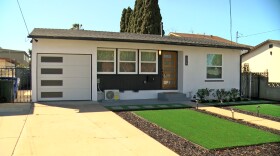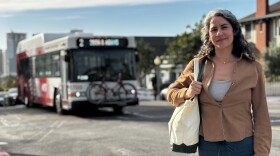In the future. Drones could be used for everything from food delivery to truck inspections those uses are being explored in a new drone pilot program here in San Diego. Now the program is looking for input from residents about their feelings on drone use in the area. Tiffany Evenson is the senior homeland security coordinator with the city of San Diego. She is leading the pilot program and joins us with a look at how this technology is and could be used. Hi Tiffany. Hi. Thanks for having me today. Thanks for joining us. All right. So the San Diego program is exploring using drones in five different areas of operation. One of those areas is for truck inspections at the ports of entry. Can you explain to us how that would work. Absolutely. So we're looking at using artificial intelligence equipped drones to support CBP and agencies with freight truck inspections and so as trucks come across the border. There are several checkpoints leading up to the actual border. And if we can get trucks across the border more quickly we can regain some of that capital that we're losing out on right now as trucks were going through other ports of entry. And what's so important about getting those trucks across the border quickly. Well right now we lose about 500 million dollars in direct annual revenue every year because we're seeing long wait times at the border. The faster we can get these trucks through the more business we'll see through San Diego they're more likely to stop at our restaurants shopping our stores and pay for gas here. So we're losing quite a bit by not having these trucks come through San Diego and another use for the drones is for medical delivery. How would that work and why is that needed. Interesting. So this is actually being done in Switzerland but will be the first in the country to do this here. We're working with our partner matter net to take specimens from hospitals over to laboratories and something that I wasn't quite aware of when I started this program was that many hospitals either don't have lab processing facilities in-house or they don't have sufficient capacity. And what they do is they hire a courier after they have so many samples that it makes financial sense to send these specimens over to a lab. Now you could be in the E.R. waiting an hour two hours three hours waiting for your labs to be processed in under the Strohm program. You could get labs processed in a significantly shorter amount of time which could free up E.R. beds and and help our healthcare system. And the San Diego program is also exploring the use of drones in the public safety realm. How could those drones help first responders. Sure so Chula Vista police department and San Diego Fire Department are working on this concept. They are pre stationing drones throughout a certain test area and upon priority 1 priority to dispatch 911 calls. These drones are sent out to the scene of the incident and because the drones can fly over obstacles they don't have to follow a straight line. They usually get to the scene of the incident much quicker than an engine or a police vehicle can. And what that means is that they can send live video feed back to our first responders and then they can make a decision of whether or not they need additional staff whether they can pull back resources. And the biggest benefit of this is that we can re allocate those resources that are pulled back from calls and make responses to other parts of the city more efficient. And what's the goal of the phase pilot program. So this pilot program is to accelerate the integration the safe integration of us into the national airspace and these drones are coming. Drones have been around for decades but now there's a commercial viability to them. And if these are going to be introduced into the national airspace we need to do it safely. And so the FAA has this program to work with local governments to get feedback from locals to do tests locally to understand how this would play with local infrastructure and a large part of the pilot program is community engagement. So right now you're asking residents to complete a survey on the use of drones. What other ways are you reaching out to the community. We had a town hall in September which was pretty successful and we're also planning to do several town halls across the city of San Diego and hopefully in Chula Vista which will host a PD of course being only down there and we'd like for residents to come out businesses to come out. Anybody who loves drones hates drones knows nothing about drones. We'd love to have you out. We'd love to have your feedback on the survey because we we send that over to the FAA and they do take that feedback seriously. And what have you heard from people so far. We've heard a mix of things. Of course there's the privacy concerns and we've been very careful about how we're doing testing right now. Mostly away from homes in rural or unpopulated areas. We've also seen a lot of excitement about the concepts that we're doing. So you know something that we're doing with Uber is food delivery and that seems to get a lot of attention. And then the medical delivery seems to be just something that people hadn't thought of. And so it's a great benefit to residents and I'm seeing a lot of excitement on this. Can you tell me what types of questions are asking residents in this online survey. First we're trying to get an understanding of who's responding so you get the standard you know age where do you live. Demographic information. But really we're looking at do you know anything about drones. And then if you do or don't. Have you heard about the FAA is safe integration campaign called the know before you fly campaign. And that's so we can we can get an idea of understanding if they know that there are attempts to safely integrate and then we're looking at what concerns they have whether it's privacy or noise or if they're excited about a certain type of technology we want to know just everything that people have to say about drones and where can they find that survey they can find the survey at W W W dot San Diego gov slash U A S and the program is going to run through October 2020 what are the next steps for the pilot program. We have the survey open through the end of the year and next year of course we have the town halls for public outreach public outreach is a huge component that will continue through this program will continue testing. And youll be able to see more operations in 2019 and we hope to have some of these fully operational by the end of next year. All right. Very nice. I have been speaking with Tiffany Vinson. She is a senior Homeland Security Coordinator with the city of San Diego. Tiffany thank you so much for joining us. Thanks for having me.
San Diego was one of 10 agencies picked by the Federal Aviation Administration for a drone pilot program that may use drones for things like food delivery and truck inspections. More than 20 regional organizations and municipalities are part of the San Diego pilot program.
The goal of the program is to demonstrate that advanced operations of drones is safe, determine what mitigations are needed to ensure drones are safe and what regulations should and should not apply to their use, said Tiffany Vinson, the senior homeland security coordinator with the city of San Diego, who is leading the pilot program.
The program is looking for input from residents about their feelings on drone use through forums and an online survey.
The survey can be accessed at sandiego.gov/uas through the end of the year.
Tiffany Vinson joins KPBS Midday Edition on Monday with a look at how this technology could be used.








